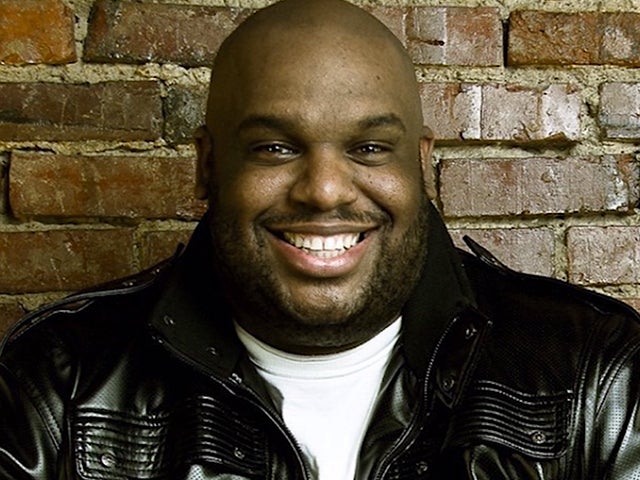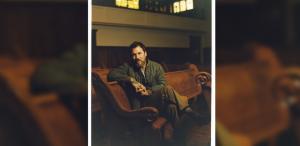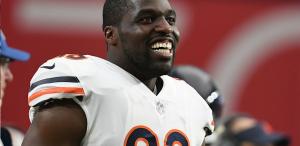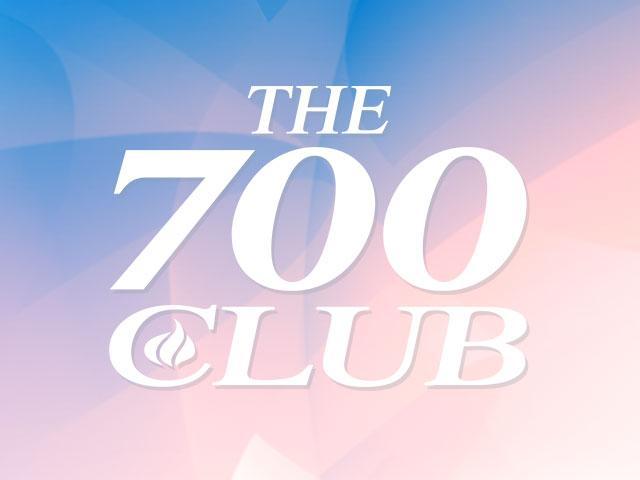The Role of the Church in Bridging Racial Divide - Extended Version
We recently sat down and spoke to pastor John Gray about his upbringing, overcoming racial stereotypes, the importance of African-American men as fathers, and the role the church can play in leading the way to bridging the racial divide in America.
Reporter Michelle Wilson states, “You have not been shy concerning speaking about race relations. And you said that you, yourself could have been a statistic, being raised by a single mother. What did you mean by that?”
Pastor John Gray shares, “I was probably four when my father left and before I was five years old my mother and father had divorced.”
John Gray was born on June 26th, 1973 in Cincinnati, Ohio. His mom reared him to love Jesus and also taught him how to be proud of his African-American identity.
John Gray says, “Cincinnati was not known as a bastion of multi-cultural celebration. I was aware that there was something very different and I knew that it had something to do with my skin being brown.”
Michelle asks, “When you say there was something very different can you be specific?”
John shares, “Well, I think that uh it was very clear that race was a precipitating factor in how people were treated, levels of opportunity, even the way counselors at school would speak to me, steer me towards vocational things as opposed to uh collegiate exploits and opportunities.”
John continues, “My mother, though, was always a bridge builder. She never let race deter her.”
Michelle asks, “What did she say to you? What kind of talks would she have with you growing up?”
John says, “You know, it wasn't so much just her talks, it was her life. she was in a-a field, a profession that African-American women were not really, you know, well represented, in mental health and social work. But she was so articulate and so it kinda threw you off because you were waiting for this angry woman to talk and then she's college educated with a big ol' afro, and so she disarms you with her intelligence, but she's unapologetic about her Blackness. And that was important because, you know, in certain areas of Christian thought they say things like, "Color doesn't matter. God doesn't see color." Well, then how come we're all not clear? He does see color. He made color. We are different aspects of a diverse God and the artistic pallet of skin tones is representative of God's heart. And I believe God wanted the diversity and he wanted these different textures and these different hair colors and all of this stuff because it's just uh an expression of his personality. But men have made it more than that. And so, for me growing up it was important uh for me to be a bridge builder.
But with all of the success he has garnered there was one thing that alluded him, not having a relationship with his father.
John remembers, “I saw my father four times in my life. And I will tell you unequivocally that who I am as a man was shaped by his absence far more than his presence. Because here at 44 years old I still long to see him, I long for his approval, and he died December 7th of 2000 on the corner of East 23rd and 1st Street in Manhattan. And I was the last person to see him alive and I told him I loved him. I told him I was going to make his name good in the earth. I told him that I forgave him for not being there. and thanked him for honoring my mother and marrying her and having me named after him. And so he gave me a chance to be the legacy that he was never able to perpetuate. Uh and so the idea of fatherhood, and then African-American fatherhood uh we're losing a generation. We're losing a generation of young people who have no identity because the fathers have not spoken it.”
Michelle states, “This is very important because you're now a father and you know that there is a stigma within the African-American community concerning absentee fathers.”
John responds, “You know, I mean the reality is the absence of fathers, I believe, is directly related to the (SIGHS) the demise of certain areas of our society. Because it is the father that speaks identity. It is the father who is the glue to the house. That's why he's called the husband, the house band. He bands the house together. When there is a strong male presence the statistics are very clear that the children are more well-rounded when a – when the father is involved, when he's speaking identity, purpose and destiny and when he's unapologetic about it. And then when you have a Christian father the statistics go even higher. I'm not concerned just about my kid’s educational attainment. I'm concerned about their And so as a father it's my job to instill in them that Jesus is king, he is Lord, and then I have to be a stabilizing force in the house. spiritual authority and their awareness that Jesus is Lord. This is the legacy that I have to leave. And so, as a father it's my job to instill in them that Jesus is king, he is Lord, and then I have to be a stabilizing force in the house. Now, for me it's a miracle that I'm even talking to you about being a father because I didn't have one in front of me, and everybody's always screaming, "Be a man of God, be a man of God." But how can you be what you've never seen. And so, I've had to create a legacy where one did not exist. And we've got men that are broken because society has done a phenomenal job of making men that look like me invisible. Uh it's almost like I'm a museum piece. You could stuff me and put me in a – in a museum one day if we're not careful, cause we're losing men that look like me at extension level rates. Whether it's through uh, you know, choice or by attrition; whether it's through the system, this justice system, or bad choices in diet and medicine and the way we carry ourselves or the stress of being a man in a society that wants to break you, waiting for you to make one mistake so they can give you the sins of hundreds of years.”
Michelle asks, “Well do you feel that perhaps the reason why you are becoming extinct is because there is such a value on the inside of you. I believe that there's something to that, when the enemy fights hard against a group of people. What is that value inside of that Black man that the world is so afraid of that God is going to really use to usher in something greater?”
John shares, “I think that's profound and I – that's a deeper question than I have time to answer. But I don't want it to just be about Black manhood. I will take it to the cross. Simon of Cyrene carried the cross of Jesus when he could not carry it himself. Cyrene is on the northern tip of the coast of Africa. He just happened to be in Jerusalem at the time of Passover, this man with skin that looked like me was the first disciple, because he literally carried the cross and followed Jesus. I think every time the enemy sees a man that looks like Simon, he's reminded of his ultimate failure. And because the enemy is visual, he sees what took him out and so he's trying to take me out. So, I believe it's not about culture, it's about kingdom. And I believe there's something that if we, as men of God and men of distinction and men of African-American ethnicity, will rise up and take our rightful place as husbands, as fathers, as leaders, we will see communities transformed and invariably the nation transformed.”
Michelle asks, “What do you think needs to happen within the Black community and within the police force? We talk about Ferguson, we talk about Cleveland, we talk about Philando Castile incident that took place. What is the answer?”
John responds, “Philando really broke my heart, and I was angry uh because Philando complied. He did what the law says in Minnesota, alerted the officer that he was legally carrying a firearm.
And of course, that didn't stop him from dying that day. and an officer shoots seven times into a car with a little girl in the back and the man's girlfriend, or fiancée in the car, uh no criminal record. It's strange how silent the church was. certain aspects of the church, as if God didn't -- didn't scream justice in the Old Testament.”
Michelle asks, “Why is the church silent on these issues? Some people say you need to have the wisdom of Solomon to speak on issues these days. But why is it that many Christians are afraid to even speak into these issues and really begin to be some earthly good?”
Johns shares, “Well, the church is downstream from society. So, unfortunately church is not taking the moral high ground, church is just filled with people who go there, many of them to make themselves feel better, not really interested in the actual Jesus. They have a projected vision and version of Jesus. And these are the same people that say, you know, ‘It doesn't matter what color he was.’ Well, if that's the case, how is it that a Middle Eastern Palestinian Jew looks startling like a Middle European man? Because imaging matters, because power matters. And in this country race still matters. And if I can elaborate a little further, we're dealing with uh over-policing in certain parts of the community uh and they have less grace because they don't see them as human. There are officers that will give grace to that which reminds them of themselves. But I am not represented and I don't remind them of themselves. There are too many images of large brown men who have done bad things, and so all of that predisposes them to give me less favor and less grace. And so, they don't see me as a husband or a father or a pastor at the largest church in this country. They don't know me as a bridge builder, they don't know that I would fight for those who have lost their lives in the line of duty, and I would stand with those families. They don't know that I fight for veterans and those who were overlooked at Vietnam War and those who the government has kinda pushed to the side. They don't know that. They see brown skin and a large man, I'm a threat. And I'm not a threat. But because they see me as that, they give me less grace.”
Michelle asks, “Are you afraid at times?”
John responds, “Absolutely. My heart still beats fast if I see a cop near me, and it shouldn’t be that way. I haven't done anything. And to live like that and to live a life of apology, to know that at certain places I need to cower down, slump my shoulders, maybe dip my eyes a little bit. There are times when I'm in a parking lot if I see a white woman walking in front of me, I go out of my way to-to give distance to let her know that she is not in danger because of me. Why do I do that? Because I understand the racial ideology and the uncomfortable nature of the way race is played out in this country that there's a fear, "There's a large man behind me and he's brown," and even though my car is nice and it's near yours and I'm actually going to where I parked, I'll go out of my way to make them feel safe. There is no such thing. It doesn't even occur to her. And people say racism doesn't exist and prejudice doesn't exist. It exists. Race and racism does exist and it exists in every facet of society. I was in a very nice hotel in Chicago coming down the elevator at one of the top hotels in the world. And uh the-the elevator stopped, it was just me. And there was a white woman and she was getting ready to get on the elevator and she looked up and saw me. And she stepped back. And this is a five-star hotel, and I had on a suit, but it didn't matter. So, I don't know what was in her mind or what she'd experienced that she was more willing to wait for another elevator than get on an elevator with a suited brown man for 30 seconds.”
Michelle asks, “Your son is going to be growing up in a world that may look at him as you have been looked at. What are the talks that you've going to have with him to prepare him for a world that may not give him a fair chance in life based upon his skin color?”
John remembers, “You know, I remember driving down the highway from church when the verdict for Trayvon Martin, the Zimmerman case came and my wife began to weep in the car. And I said, ‘Why are you crying?’ And she said, ‘I'm raising a black son.’ And it was the first time that it hit me that in all of my efforts to be multicultural and bridge-building and multidenominational, I'm still black. No matter what I do, some people will see me as a man whose skin color is the first thing that they judge me on. And my son will not get the benefit of the doubt in some cases. It hurts me. It breaks me, I'm angry. And I don't know how, I’m just going to have to be there. The fact that I have to train him differently and say, ‘If you ever keep stopped by the cops, keep your hand at the 9 and the 3. Always speak politely, don't do any sudden movements, because what is grace for one, could be death for you. This is the challenge of race in America. And no one wants to deal with – we're dealing with the fruit. We keep talking about the fruit. We haven't dealt with the root. The root is that this country was founded upon one culture being dominant and another being oppressed. I was 3/5ths of a human being at one point; constitutionally. And only for the purposes of taxation. I wasn't able to vote. It's the Civil Rights Act of '64, the voting rights act of '68. This is in the lifetime of my grandparents. There were people who had colored fountains; do you understand what I’m saying? We're just now removing Confederate monuments in American cities.”
Michelle asks, “Do you feel like that in our lifetime that we will see a world in which the African-American man, the Black man will not be considered or looked upon as a threat?”
John shares, “We're talking about are we ever going to be on equal footing? No, not-not in my lifetime. Maybe in my son's lifetime. Maybe if we have more conversations like this, maybe if there is some other folk on the other side who will meet me in the middle so we can have some honest dialogue. Again, it has to start in the church. The church has to reconcile its history. There are denominations right now that are in existence and it's based on the fact that they were proslavery and others were not. Many of the Christian schools in the south were a response to integration. It was their way of saying, ‘We're going to keep our kids pure and covered.’ So, they put Jesus on top of their Christian school, but it was just a way of saying, ‘We're not going to let them in. And-and-and so, we've got a lot to deal with, cause right now I could walk into many churches in the south and they wouldn't know me, but ‘if I had on jeans and a t-shirt they would be a little uncomfortable, not knowing who I am but that I've preached around the world, it wouldn’t matter to them. Unfortunately, they don't see me through the lens of the blood. They see me through the lens of culture. And until the blood is bigger than culture, the church will be broken.’”
Michelle asks, “I know in terms of even Martin Luther King, I don't know if you've read the book that he wrote near the end of his life titled, ‘Where Do We Go From Here? Chaos or Community?’ And the book, in essence, talked about how we have a choice. We can either live our lives together as brothers and sisters or we can live our lives apart in foolishness. And so, it's very sad, of course, I want to hear from you, that was 50 years ago, and now we're 50 years later. Do you believe that there has even been the dream that Martin Luther King had ‘I have a Dream’? Has anything taken place to the fulfillment of what he wanted to see?”
John says, “I think there are glimpses of it in certain phases of life, sure. Uh this idea of equality is rooted in the idea that everyone has inherent value. Again, these are not legislated ideas. These are Biblical ideas. But because the Bible is now no longer welcome and all of a sudden Jesus is controversial, and because the church has done a very, very poor job, in some regard to-to presenting Jesus in his proper context. Uh people don't want to hear about Jesus from us. Because they see the infighting and the insecurity and the judgment. And they see a church that wants to whitewash brokenness when we should actually be promoting brokenness. Pastors need to roll up their sleeves, stop wearing robes, show me your scars. Show me where you failed. Show me where the blood saved you. Show me where the cross found you so now I understand that there's grace for me. But if we keep screaming hell and condemnation first and works, as opposed to grace and the blood, then we are going to lose a generation. This is the first generation according to the latest Pew Research Polls, that there are less believers than more. And so how – what – how did that happen? You've got the biggest churches ever, more technology, multi-site campuses, tons of worship teams with tiny jeans on and cut-off shirts, and we have less people saved now than any other time. Could it be that we're not showing Jesus, but religion? Could it be that uh we as the church need to be at the forefront of what Dr. King was saying. Dr. King was not a civil rights leader first. He was a pastor who was a Christian who utilized Biblical foundational truths as an impetus for social change. This is why he was a revolutionary. But let us not minimize him the civil rights. He was a Christian man, and he fought because of what he saw in the word. And that, to me, is the power of the church. If we could ever grab that the principles of the word give every individual we'll ever see equal value.”
John continues, “I’m in a neighborhood now, a great neighborhood. I pay too much money to live there and I’m moving because there's one neighbor on my right I don't think I've ever met, been there a year. On the other side, we met them once. Got kids, -- their kids are my kids' age. They walk right past. Don't speak. I’m not living like that. I'm not glad to be here. I'm not – this is not the fifth ‘Excuse me, sir, you think that I can live in your neighborhood?’ No, that's not me. I'm a man and I’m going to go where I'm valued and where I’m honored. And here's the thing. Nobody's saying this. These are not things that can change based on legislation. You're dealing with the heart, and the Holy Ghost has to get ahold to your heart. So, reconciliation will begin in the church. But how do you begin in a church where many evangelicals see Jesus one way and then there are others from different race that see Jesus another way. It looks like we have two different cultures and two different Jesus's. Because one Jesus is Republican and conservative, and He's a part of the NRA and He's against immigration; and then the other Jesus is a Democrat and He's social service programs, and He's for the oppressed, and we have politicized Jesus, which is dishonorable to the cross. It's dishonorable to his blood. He's not a Republican or a Democrat or an Independent. He is a king, therefore He is a monarch. This is not a theocracy. The United States is a representative republic. But we have reduced Jesus to a political ideology which is unfair to his blood. But the reality is this, until the church reconciles that they have tried to mask Jesus behind their prejudices, we're never going to heal. And God has a word for people who think that the color of their skin makes them superior, whether that's Black, White, Mexican, whoever you are. In the book of Numbers when Mariam and Aaron opposed Moses God called a meeting and said, ‘How is it that you weren't afraid to speak against my servant?’ The Bible gives us a clue into her heart, Miriam's heart, by saying, ‘She was angry at Moses’ and she used the excuse that uh his leadership was in question. But it was because he had married an Ethiopian woman. And so Miriam had a problem with the skin color of Moses' wife. And what did God do to her? He gave her leprosy. So, you have a problem with her skin, now you have a problem with your skin. You don't hear preachers preaching about it cause it's not convenient to the narrative. To answer your question, the reason why churches don't talk about it is because they don't want to lose money. The silence of the evangelical community during this last political cycle was staggering. Because the grace they gave in the voting booth is a grace that they don't have for the preachers that preach to them. If somebody had lived in the same way and had displayed behaviors that were similar to some of our political uh candidates, they would kick them out of the church. But somehow, they found it okay to vote across multiple platforms and multiple affiliations. And this, for me, is the great challenge in the church that we have this idea that based on whatever side of the aisle you are on, Jesus is okay with that and, you know, we've get grace for that. But in the church, those who are on the front lines serving, if I fail, all of a sudden, I have no more value to you. I'll never let the church throw me away. You don't get to use me to build the church and if I show humanity, I'm no longer welcome. The church is going to have to reconcile with this uh duality, this political uh circus that has broken us. And we need to make a decision on who we're going to be. Now, as for me, I've decided I'm going to be a bridge builder, which means I put myself in harm's way. I'm always going to churches that are filled with people that don't look like me because there are many places I've gone that I was the first black person some of those people had ever hugged.”
Michelle states, “Well, the church, 95%, if statistics are correct, are not in other words have you heard that's the most segregated hour. I believe they say 5% is only multicultural. So, we have a long way to go.”
John responds, “Yeah, and I think the multicultural aspect; there's two sides to that. If you live in a community that's 95% white, then you're not going to have diversity. You know, you're not going to have 50%, you know, Kenyans in there like (SINGING) it's not going to happen, which is fine. But the issue is not diversity, the issue is the heart. Cause I grew up, you know, around predominantly Black, I mean, my family is Black, but it didn't stop me from building bridges to people who were White, or who were Hispanic, or you know, even more so and more touchy subject in the church is, you know, identity, sexuality. Because, you know, we're ready to highlight everything that's sin, but we always have grace for people who sin like us. And if you don't sin like us, then you know, we're ready to throw you away. Again, the church is going to have to reconcile. We as the church need to be at the forefront of what Dr. King was saying. Preach the gospel, walk in love, and mind your business. And if you can do that, and what Jesus said, ‘Love the Lord your God with all your heart, with all your soul, with all your strength AND love your neighbor as yourself.’”







